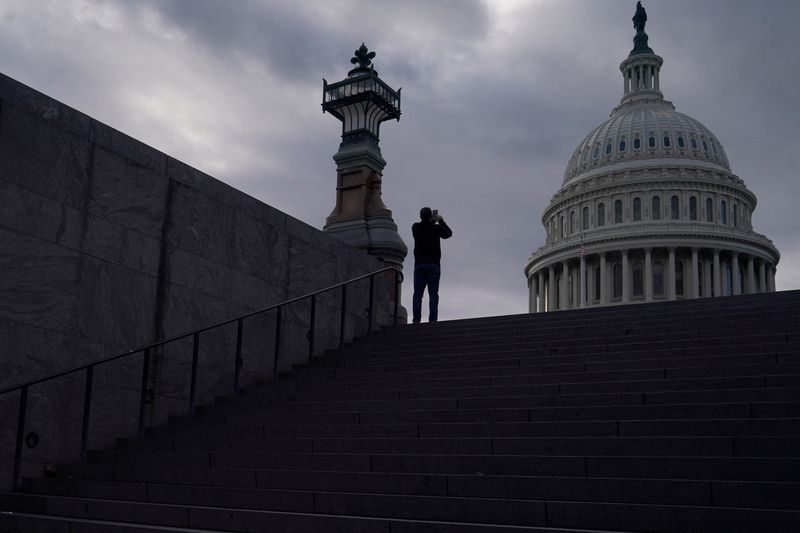
©Reuters. FILE PHOTO: A man uses his mobile phone near the U.S. Capitol in Washington, U.S., January 10, 2024. REUTERS/Nathan Howard/File Photo
By Moira Warburton
WASHINGTON (Reuters) – U.S. congressional negotiators unveiled a bill on Sunday to fund key parts of the government through the rest of the fiscal year that began in October, as lawmakers faced yet another threat of a partial lockdown if had not acted by Friday.
The legislation sets a discretionary spending level of $1.66 trillion for fiscal 2024, a spokesman for Senate Democratic Majority Leader Chuck Schumer said. It contains details of a deal that Schumer and Republican House of Representatives Speaker Mike Johnson signed in early January.
Lawmakers last week approved the fourth stopgap measure Oct. 1 to maintain government funding and set two quick deadlines for action, with funding for parts of the government, including the Department of Transportation and Food and Drug Administration, which expire in March. 8 and most other federal agencies will partially close on March 22.
The 1,050-page bill details funding for six of the dozen segments of government for which Congress is charged with appropriating funds, with the next six due by the end of the month.
The bill “maintains the aggressive investments Democrats pledged to American families, American workers, and America’s national defense,” Senate Majority Leader Chuck Schumer said in a statement.
Johnson said in a statement: “House Republicans have secured major conservative policy victories, rejected proposals from the left, and imposed sharp cuts to agencies and programs critical to President Biden’s agenda.”
While top congressional leaders have agreed to the deal, it still faces some challenges, particularly opposition from hardline House Republicans, who have repeatedly called for drastic spending cuts and generally don’t vote for spending bills.
That uncompromising energy, which led to the ouster of Johnson’s predecessor, Kevin McCarthy, has also gained traction in the traditionally more staid Senate, leading to top Republican Mitch McConnell’s decision last week to step down from his leadership role at the end of this year.
House Republicans touted the bill as a victory, although with a deeply divided caucus they had little negotiating power. The bill calls for a 10% cut in funding for the Environmental Protection Agency, 7% for the Bureau of Alcohol, Tobacco and Firearms and 6% for the FBI.
Schumer meanwhile stressed that the bill fully funds a health program for low-income families, “makes crucial investments in our infrastructure, and strengthens programs that benefit services for our veterans.”
Continued brinkmanship on the $34 trillion national debt has made credit agencies nervous. Moody’s (NYSE:) downgraded its financial outlook on the United States from “stable” to “negative” in November, citing large fiscal deficits and growing political polarization, though Fitch on Friday affirmed a “stable” outlook.
The House will have to vote on the bill before the Senate can pass the package before Friday, Schumer said. The House will return to Washington on Tuesday.
The draft also calls for congressional approval of new 20-year financing packages, worth a total of $7.1 billion, for three strategic Pacific Island nations, allies of the United States, which were agreed upon last year but they had been held up by budget disputes.
Under the so-called Compacts of Free Association, Washington provides economic assistance to the Federated States of Micronesia (FSM), the Marshall Islands (RMI) and Palau, while gaining exclusive military access to strategic areas of the Pacific coveted by its strategic rival China. .
Leaders of COFA states are increasingly concerned about the budget impasse in the US Congress and last month warned that China is actively trying to shift their allegiance, including to Taiwan.